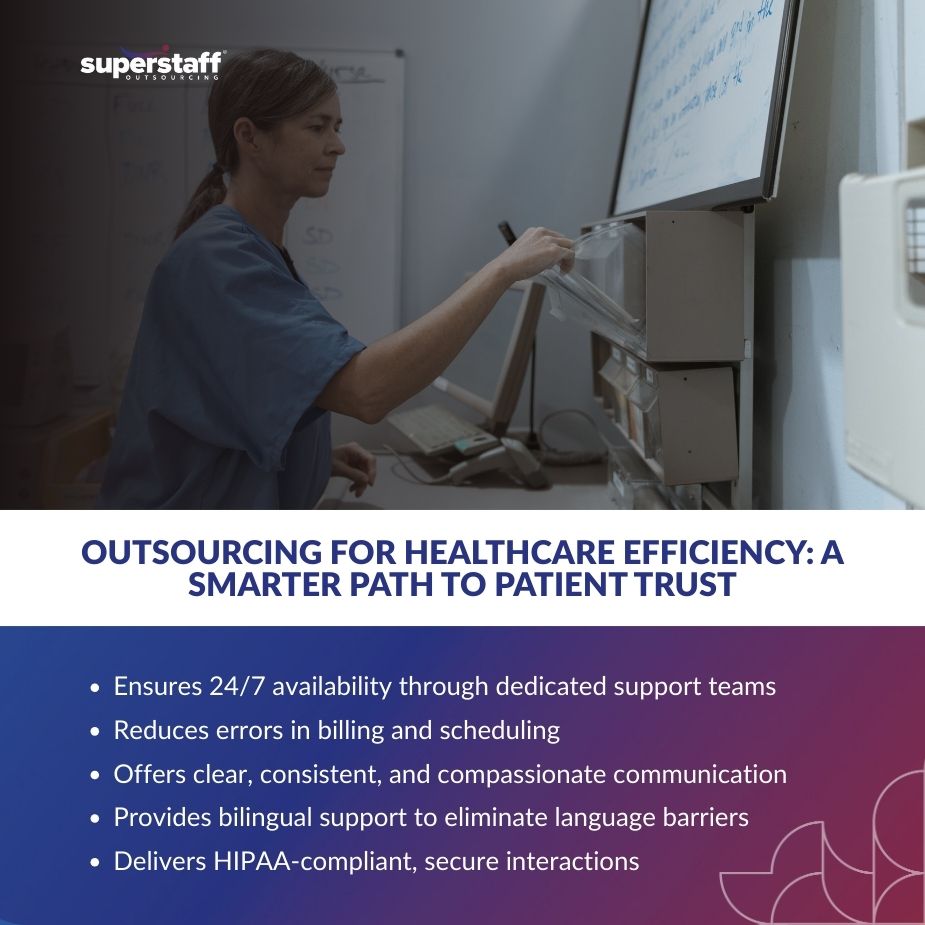
Americans are losing faith in the healthcare system. According to recent surveys, many patients report feeling overwhelmed, unheard, and underserved—frustrated by a process that feels more transactional than personal. Behind this erosion of trust are widespread issues: surprise medical bills, long wait times for authorizations, hard-to-reach service lines, and cold, scripted conversations that do little to reassure anxious patients.
In a system already strained by staff shortages and rising costs, these inefficiencies aren’t just frustrating—they’re dangerous. They contribute to delayed care, worsening outcomes, and deepening dissatisfaction. The reality is clear: patients don’t just want better treatment—they want better treatment experiences.
To rebuild trust, healthcare providers must rethink how they engage with patients beyond the clinic. Timely, compassionate, and transparent communication is now a critical pillar of care. Increasingly, providers are turning to outsourcing for healthcare efficiency, leveraging expert third-party teams to deliver fast, reliable, and human-centered non-clinical support.
In this blog, we explore how outsourcing patient support and communication can help healthcare organizations respond to growing patient expectations, reduce administrative burdens, and, most importantly, restore the trust the system so urgently needs.
Trust in the U.S. Healthcare System Is at an All-Time Low
Recent data from Gallup shows a marked decline in public satisfaction with the U.S. healthcare system. Only 44% of Americans rate the quality of medical care in the country as excellent or good—the lowest point since Gallup began tracking this metric in 2001.
Patients cite high costs, lack of transparency, and slow response times as significant issues. For many, even scheduling an appointment or clarifying a bill can feel like navigating a bureaucratic maze.
Behind these frustrations lies a systemic breakdown in administrative support. When prior authorizations are delayed or provider communication is unclear, patients question whether the system truly works in their favor. These non-clinical inefficiencies cause stress and often result in late diagnoses, missed treatments, or financial strain—all of which erode trust.
To address these pain points, healthcare organizations must take a patient-first approach, and it starts with their communication.
Outsourcing Non-Clinical Functions Improves Patient Experience Through Faster and Clearer Communication
Outsourcing non-clinical functions such as contact center services, claims processing, and appointment scheduling allows healthcare providers to respond more effectively to patients’ needs. A well-trained healthcare customer service representative can triage calls, answer insurance queries, and schedule follow-ups with a level of consistency and speed that internal staff may struggle to maintain, especially during peak periods.
Outsourced teams trained in medical terminology and compliance standards are equipped to assist patients 24/7. They streamline processes like benefits verification and claims tracking, reducing bottlenecks and enhancing transparency. This improves efficiency and drives higher satisfaction scores across patient populations.
Bilingual agents further improve patient engagement by ensuring that language is never a barrier to care. These teams can also be scaled rapidly in response to demand spikes, such as flu seasons or pandemic surges, ensuring continuity and responsiveness.
But patient support isn’t just about logistics—empathy and cultural compatibility also matter.
Cultural Alignment and Empathy in Outsourced Teams Drive Trust and Loyalty
Patients expect more than speed—they want to feel heard and understood. Many offshore BPOs, especially in the Philippines, are globally recognized for their strong cultural alignment with U.S. patients and their high standard of English fluency. These teams are trained in technical knowledge and soft skills that make a real difference in moments of stress.
A skilled healthcare customer service representative doesn’t just relay information—they provide reassurance, clarity, and emotional support. Offshore agents learn to adapt their scripts and tone to match the provider’s brand voice, ensuring every interaction feels personal and trustworthy.
This human connection builds confidence. It shows patients that they are not just another number, but valued individuals receiving thoughtful and informed care.
This connection is vital in building confidence in a system where patients often feel overlooked.

Outsourcing Reduces Administrative Burden, Freeing Up Internal Teams to Focus on Care
Physicians and nurses often find themselves overwhelmed with paperwork and repetitive administrative tasks, from insurance verifications to patient intake and follow-ups. This burden contributes significantly to burnout and ultimately impacts the quality of care delivered.
By outsourcing these high-volume, non-clinical functions to trusted partners, providers can reduce internal workload and free up valuable time for direct patient care. Outsourced teams can manage everything from billing inquiries to pre-visit preparation, allowing medical professionals to focus on diagnosis, treatment, and bedside support.
The result: improved workflow efficiency, reduced wait times, and a more satisfied, less overburdened staff. These improvements benefit operations and contribute directly to the impact of outsourcing on patient trust and healthcare service quality.
This operational support also creates new opportunities for value-based care initiatives.
Outsourced Communication Helps Meet Compliance and Patient Engagement Metrics
Today’s healthcare system is pressured to meet a complex set of metrics tied to reimbursement and patient satisfaction. From HIPAA regulations to HCAHPS (Hospital Consumer Assessment of Healthcare Providers and Systems) scores, compliance and quality tracking are integral to success.
Healthcare BPOs are built for this level of scrutiny. Many offer HIPAA-compliant services with secure data protocols and performance analytics baked into their systems. Outsourced teams can help reduce no-show rates, improve call resolution time, and elevate CSAT (customer satisfaction) scores through consistent, data-backed communication processes.
These outcomes are essential not only for financial incentives but also to improve patient engagement and long-term trust. Clear, timely, and respectful communication encourages patients to stay engaged in their care plans—and to recommend providers to others.
As healthcare evolves, providers must choose partners that offer both compassion and compliance.
Choosing the Right Outsourcing Partner Is Key to Restoring Healthcare Trust
Not all outsourcing providers are created equal. To truly move the needle on trust and service quality, healthcare organizations must seek partners who specialize in the industry and understand the regulatory and emotional nuances of patient support.
The right BPO will offer:
- Healthcare-specific training for agents
- Transparent communication and quality assurance systems
- Technology integration with existing EMRs and patient portals
- Scalable support with multilingual capabilities
- Strict adherence to data privacy and compliance standards
When evaluating potential partners, providers should prioritize cultural compatibility, patient-first values, and long-term scalability. Contracts should allow for flexibility and collaboration, not just transactional service delivery.
With the right support team, healthcare providers can take proactive steps to win back patient trust.
Rebuilding Trust Through Outsourcing for Healthcare Efficiency
As trust in U.S. healthcare declines, outsourced patient support offers a path to more transparent, responsive care. From easing administrative pressure to enhancing empathetic communication, outsourcing plays a pivotal role in re-humanizing healthcare experiences.
By leveraging outsourcing for healthcare efficiency, providers can improve service delivery, reduce staff burnout, and strengthen relationships with patients. When done right, outsourcing doesn’t just solve logistical problems—it becomes a strategic tool to improve patient engagement, elevate brand reputation, and restore the confidence that patients so urgently need.
Partner with SuperStaff to build patient trust through world-class support solutions that blend compassion, compliance, and efficiency.






